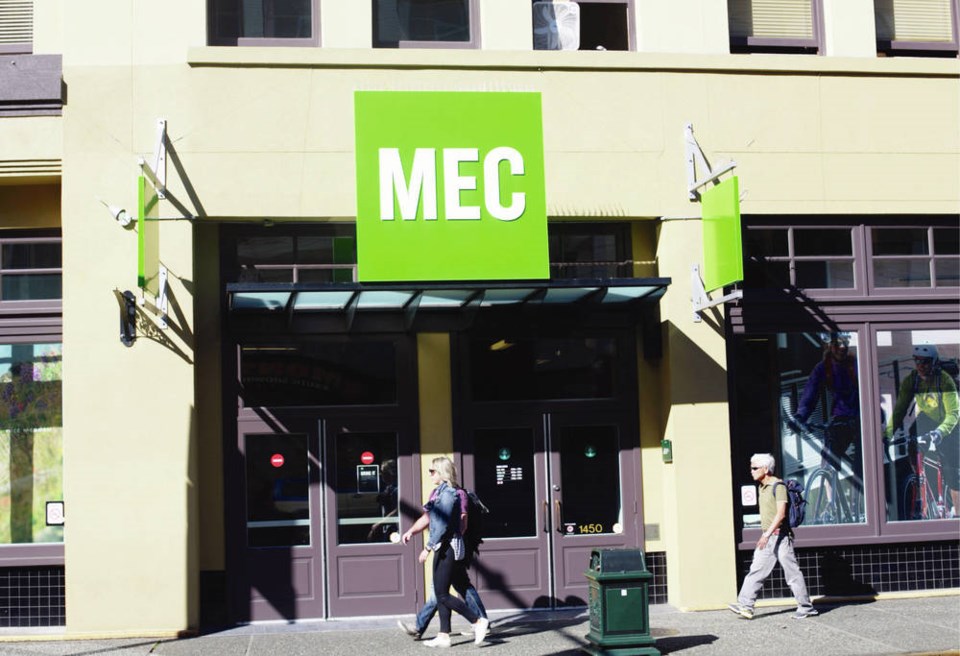VANCOUVER — Retail analysts are cautioning that more Canadian stores could follow Mountain Equipment Co-op’s path toward restructuring in the coming months as the pandemic pushes an increasingly fractured retail market to the brink.
The Vancouver-based sports and outdoor recreation retailer announced Monday it had obtained creditor protection and would be sold to a U.S. private investment firm.
MEC is the latest in a line of struggling retailers to obtain court protection from creditors in recent months as COVID-19 accelerates a marketplace shift to online shopping.
Retailers have been battling increasing competition for years as more foreign brands open brick and mortar stores in Canada and the fight for e-commerce dollars intensifies.
Experts say the temporary shutdown in the spring was the final straw for many companies that were already struggling.
Footwear retailer Aldo Group was among the first iconic Canadian brands to seek creditor protection last spring, followed by clothing retailer Reitmans Canada with its brands Thyme Maternity and Addition Elle and Comark Holdings with its brands Ricki’s and Cleo.
Michael LeBlanc, a senior retail adviser with the Retail Council of Canada, said the retail landscape was undergoing tremendous transformation before the pandemic hit.
“It was already a fiercely competitive environment,” LeBlanc said, noting the generational shift to online shopping and increasingly crowded marketplace.
“To then close the physical stores and go a couple months without sales is hard to recover from.”
Lisa Hutcheson, managing partner at consulting firm J.C. Williams Group, said the first retailers to seek creditor protection following the COVID-19 closures were “low-hanging fruit,” but this latest case suggests others will follow.
“MEC is a little bit more surprising,” she said. “They certainly have a deep loyalty base. The environment right now is tough.”
One of the challenges that could face MEC as it emerges from restructuring will be maintaining that loyalty under new ownership, said Bruce Winder, a retail analyst and author of the book Retail Before, During and After COVID-19.
While California-based Kingswood Capital Management has formed a B.C.-based subsidiary to run the company, he said co-op members may not support “the Wall Street-type financial firm coming in and making quick and dirty moves.”
“There’s a higher risk of turbulence when a private equity firm buys a retailer — than especially with MEC,” Winder said.
“It’s such a green, grassroots kind of tree-hugging company with such a strong relationship with its customers. I can’t see those customers taking well to this change.”
Indeed, nearly 10,000 members and supporters of the Canadian outdoor equipment chain had signed an online petition by Tuesday afternoon to stop the deal.
Saul Klein, dean at the Gustavson School of Business at the University of Victoria, said the effect on the MEC brand could be devastating.
“We don’t often see a co-op sold out from under its members to a for-profit company and it’s also a loss of a fairly iconic Canadian brand to an American private equity company,” Klein said. “The MEC brand is tied to its values around sustainability and social responsibility. The big question will be are the new owners going to subscribe to the same values and keep the same positioning in the marketplace?
“If they don’t, they run the risk of losing their existing customers, and if they do try and retain them will they be seen as credible as MEC.”
Klein noted MEC has always been either top spot or No. 2 on the Gustavson School’s annual Trust Index. When it was published in May of this year MEC held top spot ahead of brands like CAA, Costco and Dyson.
“MEC is a powerful example of a brand that’s built a very strong consumer franchise, but obviously not strong enough to get through really tough economic conditions,” Klein said.
Marketing professor David Soberman said although MEC’s brand as a local and environmentally conscious retailer is important, so is keeping its doors open.
“We have to remember that they’re facing creditor protection,” said the University of Toronto Rotman School of Management professor.
“We can sit here and say, ‘This isn’t going to be good for the brand,’ but closing all the stores and disappearing is not good for the MEC brand either.”
Meanwhile, a second wave of the pandemic could be the downfall for other retailers that have so far managed to survive.
“If governments impose another mass shutdown, you’ll certainly see a greater number of retailers going under,” Winder said.
He added that the anticipated wind down of federal wage subsidies and emergency benefits later this year could impact both the bottom line of retailers and the spending power of consumers.
“I expect retailers will try to get through the holiday season, but I expect we could see more bankruptcies in January and February.”
— With a file from Andrew A. Duffy, Times Colonist



